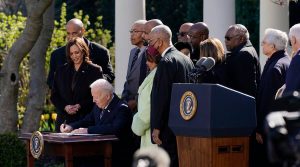Lynching a Federal Hate Crime : US

U.S. President Joe Biden has signed a bill into law to make lynching a federal hate crime, more than 100 years after such legislation was first proposed.
- The Emmett Till Anti-Lynching Act is named after the Black teenager whose killing in Mississippi in the summer of 1955 became a galvanising moment in the civil rights era.
- The new law makes it possible to prosecute a crime as a lynching when a conspiracy to commit a hate crime leads to death or serious bodily injury.
- The law lays out a maximum sentence of 30 years in prison and fines.
- In 2021 in Assam, a 23-year-old student leader was allegedly killed by a mob.
- In October 2021 a man was allegedly lynched, his limbs cut off and left to die at the Singhu Border, site of the farmers’ protest against the three farm laws.
- In August 2021, a bangle seller in Indore was reportedly beaten up by a mob for allegedly hiding his identity.
- The man survived and was sent to judicial custody.
- In May 2021, a 25-year-old Gurugram man was allegedly lynched when he went out to buy medicines.
- On December 18 2021, a man was lynched to death by the Sikh Sangat (Sikh devotees) in Shri Harmandir Sahib Gurudwara (Golden Temple) in Amritsar over an alleged attempt to disrespect the holiest book of Sikh religion, Shri Guru Granth Sahib Ji.
Lynching:
- Any act or series of acts of violence or aiding, abetting (encouraging) such act/acts thereof, whether spontaneous or planned, by a mob on the grounds of religion, race, caste, sex, place of birth, language, dietary practices, sexual orientation, political affiliation, ethnicity or any other related grounds.
- There is “no separate” definition for such incidents under the existing IPC. Lynching incidents can be dealt with under Section 300 and 302 of IPC.
- Section 302 provides that whoever commits murder shall be punished with death or imprisonment for life and shall also be liable to fine. Offence of murder is a cognisable, non- bailable and non-compoundable offence.
- There should be a “separate offence” for lynching and the trial courts must ordinarily award maximum sentence upon conviction of the accused person to set a stern example in cases of mob violence.
- The state governments will have to designate a senior police officer in each district for taking measures to prevent incidents of mob violence and lynching.
- The state governments need to identify districts, sub-divisions and villageswhere instances of lynching and mob violence have been reported in the recent past.
- The nodal officers shall bring to the notice of the DGP about any inter-district co-ordination issues for devising a strategy to tackle lynching and mob violence related issues.
- Every police officer shall ensure to disperse the mob that has a tendency to cause violence in the disguise of vigilantism or otherwise.
- Central and the state governments shall broadcast on radio, television and other media platforms about the serious consequences of mob lynching and mob violence.
- Despite the measures taken by the State Police, if it comes to the notice of the local police that an incident of lynching or mob violence has taken place, the jurisdictional police station shall immediately lodge an FIR.
- The State Governments shall prepare a lynching/mob violence victim compensation scheme in the light of the provisions of Section 357A of CrPC.
- If a police officer or an officer of the district administration fails to fulfill his duty, it will be considered an act of deliberate negligence.




